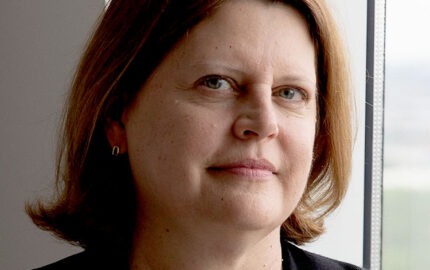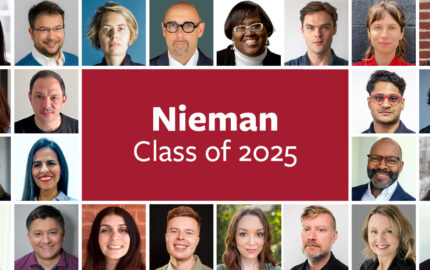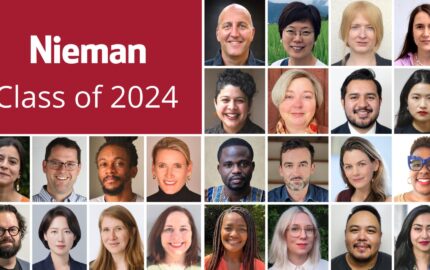The Nieman Foundation for Journalism, a leading global voice in professional journalism education and journalistic innovation for 79 years, has selected 23* journalists as members of the Nieman class of 2017. The group includes reporters, writers, correspondents, editors, producers, columnists, filmmakers, a photographer, a director, digital strategists and news executives who work around the world. The new Nieman Fellows will begin an academic year of study at Harvard University this fall.
Throughout 2016, Nieman additionally is hosting eight Knight Visiting Nieman Fellows for shorter periods to work on research projects designed to advance journalism.
The Nieman Foundation has educated more than 1,500 accomplished journalists from 94 countries since 1938. The fellowship has expanded in recent years to include new collaborative and experimental programs. In addition to taking classes during their time at Harvard, fellows attend Nieman seminars, workshops and master classes and work on their research with Harvard scholars and other leading thinkers in the Cambridge area.
Michelle Boorstein, religion reporter for The Washington Post, will study the renegotiation of religion’s place in American public life. Her examination will include legal issues, sociological changes and the history of secularism.
@mboorstein
Lolly Bowean, a reporter for the Chicago Tribune, will study the cultural differences between the African-American descendants of American slavery and the children of black immigrants. She also will research the evolution of the black family in America.
@lollybowean
Tyler Dukes, an investigative reporter for WRAL News in North Carolina, will study best practices for college journalism programs and newsrooms looking to democratize data-driven reporting for underserved communities.
@mtdukes
Felicia Fonseca, an Arizona-based correspondent for The Associated Press, will study the plight of American Indian tribes and their efforts to build sustainable economies that don't rely heavily on the federal system.
@FonsecaAP
Katherine Goldstein, who has worked as a senior editor at Slate and Vanity Fair, will examine digital journalism strategies for hiring and retaining a diverse workforce and the particular challenges facing working mothers in the industry.
@KGeee
Roland Kelts, a Tokyo-based author, contributing writer to The New Yorker and columnist for The Japan Times, will study the proliferation of streaming media content and the spread of Asian popular culture in the West, driven by digital natives worldwide.
@rolandkelts
Brady McCollough, a projects reporter for sports and news at the Pittsburgh Post-Gazette, will examine the future of football in America, focusing on medical research and the role journalism plays in light of growing knowledge about the game’s health impact on players.
@BradyMcCollough
Jeneé Osterheldt, a lifestyle columnist for The Kansas City Star, will study theories of discrimination and their application to storytelling on diverse subjects. Her research will include black and women’s studies, as well as the history of feminism.
@JeneeinKC
Jason Rezaian, a reporter for The Washington Post and the paper’s former Tehran bureau chief, will study what the new arc of U.S.-Iran relations means for American foreign policy in the Middle East. Drawing on his unique experiences in Iran, he will examine the possibilities and the challenges of this diplomatic opening.
@jrezaian
Mary Louise Schumacher, the art and architecture critic for the Milwaukee Journal Sentinel, will study emerging strategies within the fields of architecture and urban design for addressing issues of racial and economic inequity.
@artcity
Heidi Vogt, East Africa correspondent for The Wall Street Journal, will study world religions, particularly the way Islam, Christianity, Hinduism, Judaism and Buddhism adapt to societies with an increasing diversity of faiths.
@HeidiVogt
Jassim Ahmad (UK), the head of multimedia innovation at Reuters, will examine how fully journalism organizations are exploiting technology, focusing on storytelling formats, user orientation, open platforms and organizational culture.
@JassimA
Georg Diez (Germany), a reporter and columnist covering politics and culture for Der Spiegel, will study how a new Web-based journalistic platform could enable worldwide conversations around specific topics—a digital salon offering an alternative to how knowledge is traditionally shared by legacy media.
@GeorgDiez1
Christian Feld (Germany), a Brussels-based political correspondent for ARD German TV, will design a training program to provide European journalists with a solid knowledge of computer science and cyberspace policies and increase their digital literacy.
@ChrFeld
Nkem Ifejika (UK/Nigeria), a presenter at the BBC World Service in London, will explore media ownership and organizational structures in Nigeria, and how these might be overhauled to improve standards and trust between journalists and the public.
@nkemifejika
Kim Kyoungtae (South Korea), an editor for Munhwa Broadcasting Corporation, will study the proper role of media in peacefully solving international conflicts, focusing specifically on northeastern Asia. He will also explore developments in providing interactive news content to mobile devices. His fellowship is supported by The Asia Foundation.
Maciek Nabrdalik (Poland), a documentary photographer and member of the VII Photo Agency, will study the social transformations caused by migration, particularly the relation between mobility and religious practices.
@MaciekNabrdalik
Chisomo Ngulube (Malawi), chief editor for TV News at the Malawi Broadcasting Corporation, will examine how to maintain journalistic standards during an era of media convergence. She will also prepare for growing Internet adoption in her country.
@chisokay
Karin Pettersson (Sweden), the political editor-in-chief at Aftonbladet, Scandinavia’s biggest daily newspaper, will study how extreme right-wing and racist movements use digital platforms to reach audiences and how this affects the work of traditional media.
@AB_Karin
Subina Shrestha (Nepal), a filmmaker and correspondent for Al Jazeera, will study international human rights issues, including human trafficking and labor migration, as a lens into how Nepali women and minorities may achieve social and political rights.
@ShresthaSubina
Robert Socha (Poland), deputy executive producer for TV documentary programs at TVN Poland, will study the transition of linear TV broadcasters to the digital world. He will compare European and U.S. developments in video on demand, virtual reality and video storytelling.
@Robert_Socha
Alisa Sopova (Ukraine), a freelance producer and reporter for The New York Times in Ukraine, will study different writing techniques in English, with a focus on American journalistic tradition, style and tools. Sopova is Harvard’s first Ukrainian Nieman Fellow.
Marcela Turati (Knight Latin American Nieman Fellow, Mexico), an investigative journalist covering the Mexican drug war, will study historic and current examples of systemic violence and its impact on individuals, communities and institutions, with a focus on resilience and the role of the press.
@marcelaturati
The Knight Visiting Nieman Fellows studying at Harvard this year are supported by a grant from the John S. and James L. Knight Foundation:
In selecting the Nieman class of 2017, Nieman Foundation curator Ann Marie Lipinski, a 1990 Nieman Fellow, was joined by Laura Amico the news editor for multimedia and data projects at The Boston Globe and a 2013 Nieman Fellow; Henry Chu, most recently the London bureau chief for the Los Angeles Times and a 2015 Nieman Fellow; Rohit Deshpande, Sebastian S. Kresge Professor of Marketing at Harvard Business School; and James Geary, Nieman’s deputy curator and a 2012 Nieman Fellow.
The Nieman Foundation for Journalism at Harvard educates leaders in journalism and elevates the standards of the profession through special programs that convene scholars and experts in all fields. More than 1,500 journalists from 94 countries have been awarded Nieman Fellowships since 1938. The foundation’s other initiatives include Nieman Reports, a quarterly print and online magazine that covers thought leadership in journalism; Nieman Journalism Lab, a website that reports on the future of news, innovation and best practices in the digital media age; and Nieman Storyboard, a website that showcases exceptional narrative journalism and explores the future of nonfiction storytelling.
* Original announcement has been edited to reflect a change in the class composition.
Throughout 2016, Nieman additionally is hosting eight Knight Visiting Nieman Fellows for shorter periods to work on research projects designed to advance journalism.
The Nieman Foundation has educated more than 1,500 accomplished journalists from 94 countries since 1938. The fellowship has expanded in recent years to include new collaborative and experimental programs. In addition to taking classes during their time at Harvard, fellows attend Nieman seminars, workshops and master classes and work on their research with Harvard scholars and other leading thinkers in the Cambridge area.
U.S. Nieman Fellows in the class of 2017 and their study plans:
Michelle Boorstein, religion reporter for The Washington Post, will study the renegotiation of religion’s place in American public life. Her examination will include legal issues, sociological changes and the history of secularism.
@mboorstein
Lolly Bowean, a reporter for the Chicago Tribune, will study the cultural differences between the African-American descendants of American slavery and the children of black immigrants. She also will research the evolution of the black family in America.
@lollybowean
Tyler Dukes, an investigative reporter for WRAL News in North Carolina, will study best practices for college journalism programs and newsrooms looking to democratize data-driven reporting for underserved communities.
@mtdukes
Felicia Fonseca, an Arizona-based correspondent for The Associated Press, will study the plight of American Indian tribes and their efforts to build sustainable economies that don't rely heavily on the federal system.
@FonsecaAP
Katherine Goldstein, who has worked as a senior editor at Slate and Vanity Fair, will examine digital journalism strategies for hiring and retaining a diverse workforce and the particular challenges facing working mothers in the industry.
@KGeee
Roland Kelts, a Tokyo-based author, contributing writer to The New Yorker and columnist for The Japan Times, will study the proliferation of streaming media content and the spread of Asian popular culture in the West, driven by digital natives worldwide.
@rolandkelts
Brady McCollough, a projects reporter for sports and news at the Pittsburgh Post-Gazette, will examine the future of football in America, focusing on medical research and the role journalism plays in light of growing knowledge about the game’s health impact on players.
@BradyMcCollough
Jeneé Osterheldt, a lifestyle columnist for The Kansas City Star, will study theories of discrimination and their application to storytelling on diverse subjects. Her research will include black and women’s studies, as well as the history of feminism.
@JeneeinKC
Jason Rezaian, a reporter for The Washington Post and the paper’s former Tehran bureau chief, will study what the new arc of U.S.-Iran relations means for American foreign policy in the Middle East. Drawing on his unique experiences in Iran, he will examine the possibilities and the challenges of this diplomatic opening.
@jrezaian
Mary Louise Schumacher, the art and architecture critic for the Milwaukee Journal Sentinel, will study emerging strategies within the fields of architecture and urban design for addressing issues of racial and economic inequity.
@artcity
Heidi Vogt, East Africa correspondent for The Wall Street Journal, will study world religions, particularly the way Islam, Christianity, Hinduism, Judaism and Buddhism adapt to societies with an increasing diversity of faiths.
@HeidiVogt
International Nieman Fellows in the class of 2017 and their study plans:
Jassim Ahmad (UK), the head of multimedia innovation at Reuters, will examine how fully journalism organizations are exploiting technology, focusing on storytelling formats, user orientation, open platforms and organizational culture.
@JassimA
Georg Diez (Germany), a reporter and columnist covering politics and culture for Der Spiegel, will study how a new Web-based journalistic platform could enable worldwide conversations around specific topics—a digital salon offering an alternative to how knowledge is traditionally shared by legacy media.
@GeorgDiez1
Christian Feld (Germany), a Brussels-based political correspondent for ARD German TV, will design a training program to provide European journalists with a solid knowledge of computer science and cyberspace policies and increase their digital literacy.
@ChrFeld
Nkem Ifejika (UK/Nigeria), a presenter at the BBC World Service in London, will explore media ownership and organizational structures in Nigeria, and how these might be overhauled to improve standards and trust between journalists and the public.
@nkemifejika
Kim Kyoungtae (South Korea), an editor for Munhwa Broadcasting Corporation, will study the proper role of media in peacefully solving international conflicts, focusing specifically on northeastern Asia. He will also explore developments in providing interactive news content to mobile devices. His fellowship is supported by The Asia Foundation.
Maciek Nabrdalik (Poland), a documentary photographer and member of the VII Photo Agency, will study the social transformations caused by migration, particularly the relation between mobility and religious practices.
@MaciekNabrdalik
Chisomo Ngulube (Malawi), chief editor for TV News at the Malawi Broadcasting Corporation, will examine how to maintain journalistic standards during an era of media convergence. She will also prepare for growing Internet adoption in her country.
@chisokay
Karin Pettersson (Sweden), the political editor-in-chief at Aftonbladet, Scandinavia’s biggest daily newspaper, will study how extreme right-wing and racist movements use digital platforms to reach audiences and how this affects the work of traditional media.
@AB_Karin
Subina Shrestha (Nepal), a filmmaker and correspondent for Al Jazeera, will study international human rights issues, including human trafficking and labor migration, as a lens into how Nepali women and minorities may achieve social and political rights.
@ShresthaSubina
Robert Socha (Poland), deputy executive producer for TV documentary programs at TVN Poland, will study the transition of linear TV broadcasters to the digital world. He will compare European and U.S. developments in video on demand, virtual reality and video storytelling.
@Robert_Socha
Alisa Sopova (Ukraine), a freelance producer and reporter for The New York Times in Ukraine, will study different writing techniques in English, with a focus on American journalistic tradition, style and tools. Sopova is Harvard’s first Ukrainian Nieman Fellow.
Marcela Turati (Knight Latin American Nieman Fellow, Mexico), an investigative journalist covering the Mexican drug war, will study historic and current examples of systemic violence and its impact on individuals, communities and institutions, with a focus on resilience and the role of the press.
@marcelaturati
The 2016 Nieman Visiting Fellows
The Knight Visiting Nieman Fellows studying at Harvard this year are supported by a grant from the John S. and James L. Knight Foundation:
- Maya Baratz Jordan, most recently head of new products at Disney/ABC Television, examined new formats for nonfiction storytelling via text messaging.
- David Barboza, a reporter for The New York Times who most recently served as Shanghai bureau chief, will build new tools for investigative reporting in China, including a business and financial database of Chinese companies.
- Bill Church, executive editor of the Sarasota Herald-Tribune and southeast regional editor of GateHouse Media, is exploring the organizational behavior of small newsrooms and examining new models for adaptability and innovation.
- Fatemah Farag, founder and CEO of Welad El Balad Media Services in Egypt, will research the relationship between community engagement and media production. Her goal is to define models for business development and sustainability for alternative media in Egypt and the Middle East.
- Walter Frick, a senior associate editor at Harvard Business Review, will research how machine learning can help news organizations better organize background information and archive material in order to provide context for journalists and readers when news breaks.
- Paul McNally, a radio journalist for Wits Journalism and director of The Citizen Justice Network in South Africa, will develop an online tool to organize citizen journalism into a network for investigative reporting. The project will blend traditional and digital strategies for the development of local stories.
- An Xiao Mina, director of product at Meedan, examined how language barriers affect global news coverage. She conducted a case study around a specific news event to measure the impact of translations and annotations of social media on diversifying reportage.
- Tara Pixley, a freelance photojournalist, will identify structural challenges to finding and accessing images from photojournalists outside the Western media network. She aims to create a platform to showcase quality global photojournalism and provide news photo editors with diverse perspectives that depict non-Western people and places.
In selecting the Nieman class of 2017, Nieman Foundation curator Ann Marie Lipinski, a 1990 Nieman Fellow, was joined by Laura Amico the news editor for multimedia and data projects at The Boston Globe and a 2013 Nieman Fellow; Henry Chu, most recently the London bureau chief for the Los Angeles Times and a 2015 Nieman Fellow; Rohit Deshpande, Sebastian S. Kresge Professor of Marketing at Harvard Business School; and James Geary, Nieman’s deputy curator and a 2012 Nieman Fellow.
The Nieman Foundation for Journalism at Harvard educates leaders in journalism and elevates the standards of the profession through special programs that convene scholars and experts in all fields. More than 1,500 journalists from 94 countries have been awarded Nieman Fellowships since 1938. The foundation’s other initiatives include Nieman Reports, a quarterly print and online magazine that covers thought leadership in journalism; Nieman Journalism Lab, a website that reports on the future of news, innovation and best practices in the digital media age; and Nieman Storyboard, a website that showcases exceptional narrative journalism and explores the future of nonfiction storytelling.
* Original announcement has been edited to reflect a change in the class composition.



